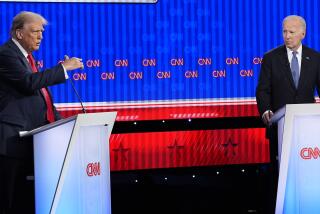Opinion: Is Rick Perry’s focus on Iraq another ‘Oops’?

Former Texas Gov. Rick Perry speaks during his presidential campaign kick-off event in Addison, Texas, on June 4.
On Thursday former Texas Gov. Rick Perry launched his candidacy for the 2016 Republican nomination (and a zillion jokes recycling his famous memory lapse in a 2012 debate).
His speech was a predictable collection of aw-shucks autobiography (“For years we had an outhouse, and mom bathed us in a number two washtub on the back porch”), conservative platitudes about American exceptionalism and a nod to populism (“Capitalism is not corporatism”).
Perhaps the most intriguing element of the speech was Perry’s claim that the U.S. had won the war in Iraq, only to have that victory squandered by President Obama.
“Let no one be mistaken, leaders of both parties have made grave mistakes in Iraq. But in January 2009 – when Barack Obama became commander-in-chief – Iraq had been largely pacified,” Perry said. “America had won the war. But our president failed to secure the peace.”
This is a common meme on the right, but it poses some problems. Perry referred to Obama’s “withdrawal of American troops from Iraq.” But it was actually George W. Bush who in 2008 agreed to a Status of Forces agreement with the government of Iraq that said: “All U.S. forces are to withdraw from all Iraqi territory, water and airspace no later than the 31st of December of 2011.”
The more sophisticated version of Perry’s argument is that, sure, that’s what Bush agreed to, but (in the words of Charles Krauthammer) “everyone involved, Iraqi and American, knew that the 2008 SOFA calling for full U.S. withdrawal was meant to be renegotiated.” Obama was unable to negotiate such a revision, meaning that no residual U.S. force remained in Iraq to subdue that country’s sectarian divisions.
There may be some truth in this argument, but it contains a very debatable assumption: that the presence of a sizable U.S. force would have magically motivated Iraq’s armed forces and sectarian factions to commit themselves to nation-building. Recent events in Iraq suggest that the stability in Iraq that Obama inherited wasn’t deep-rooted.
But assume that Krauthammer, Perry and others who accuse Obama of “losing Iraq” are right. Does that mean they want the U.S. to send U.S. troops back to Iraq in significant numbers? Perry has said that defeating Islamic State would require “some boots on the ground.” His fellow presidential candidate Sen. Lindsey Graham of South Carolina has put a number on such a force: 10,000.
That raises the question of whether advocating such intervention is good politics.
In the Republican primaries it might be: According to a Quinnipiac University poll released last week, 62% of Republicans said that “going to war with Iraq in 2003 was the right thing for the United States to do.” But the idea might not be so popular with the general electorate. Among all registered voters, only 32% thought going to war in Iraq 12 years ago was “the right thing.” For Democrats, the response was 16%. For independents it was 26%.
A Rasmussen Reports poll of likely voters released May 22 explicitly asked whether U.S. combat troops should be sent back to Iraq as part of an international coalition to fight ISIS. Only 35% answered yes.
That suggests that even some Americans who might agree with Perry that Obama “lost Iraq” aren’t eager to commit the lives and treasure to try to reverse that loss. Politically, Perry’s decision to focus on Iraq may prove to be another “Oops.”
Follow Michael McGough on Twitter @MichaelMcGough3
More to Read
A cure for the common opinion
Get thought-provoking perspectives with our weekly newsletter.
You may occasionally receive promotional content from the Los Angeles Times.











